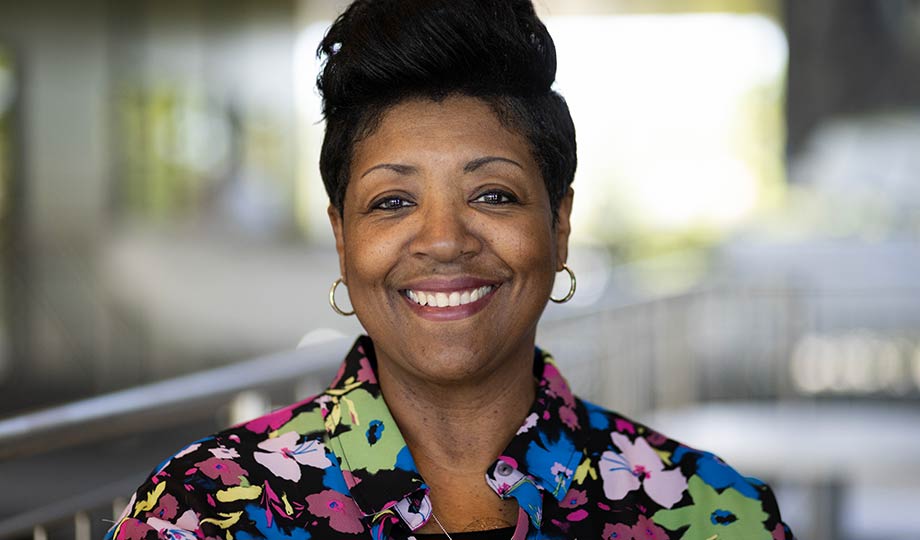The Human Services program is dedicated to providing quality instruction and in-depth clinical training for students interested in serving and assisting people in the areas of addictions, applied gerontology, corrections, developmental disabilities, domestic/family violence and residential child care.
Human Services programs expose students to comprehensive theoretical instruction as well as expert clinical training and practical experience. In addition to certificate or degree options, many working professionals choose to complete Human Services coursework at COD for Continuing Education Units (CEUs).

All Human Services programs are accredited by the Illinois Certification Board.
Determine Your Path
Students who graduate from Human Services are prepared to enter the workforce in entry-level positions or transfer their credits to a four-year college or university for advanced education and training.
You want to attend a credible college that stands out from the rest. At COD, you'll discover:
- Dedicated Human Services faculty comprised of psychologists, social workers, licensed counselors and marriage/family therapists who can share their specific training and experiences with students.
- Interactive courses with instruction in top-notch facilities and on-cutting edge equipment.
- Flexible schedules with day and evening classes, online learning and hybrid classes.
- Practical, hands-on experience as well as classroom-based studies.
- An innovative transfer program with National Louis University that offers a seamless transfer of credits for students who want to earn their bachelor's degree.
- Program accreditation from the Illinois Certification Board.
Accreditation Information
Addictions Counseling, A.A.S.
The Addictions Counseling degree prepares students to work with an addictions population while earning an associate's degree. Advanced training meets Illinois Certification Board standards for the addictions counseling certification (CADC) with a passing exam score.
Addictions Counseling, Certificate
The Addictions Counseling certificate provides accredited training to work with clients and their families on addictions and related problems. This program is approved by the Illinois Certification Board. A minimum of an AA/AS degree is required for Certified Alcohol and Other Drug Abuse Counselor (CADC) certification. The certificate requires the courses listed below.
Applied Gerontology, Certificate
The Applied Gerontology certificate prepares students to work with an older adult population to meet their unique needs. This certificate requires 38 credits in the courses listed below.
Co-occurring Disorders, Certificate
Students who complete the Co-occurring Disorders Certificate will have solid foundational knowledge of people who experience both mental illness and substance use disorder. The skills and attitudes emphasized in this program of study will help prepare students to work with this population.
Corrections Counseling, Certificate
The Corrections Counseling certificate will provide specialized education for those working in the corrections counseling setting. This certificate requires 39 credits in the courses listed below.
Developmental Disabilities, Certificate
The Developmental Disabilities certificate provides specialized education to prepare an entry level human services professional to work with clients with developmental disabilities. The certificate requires 34 credits in the courses listed below.
Human Services Domestic/Family Violence, Certificate
The Human Services Domestic/Family Violence certificate prepares students for entry-level human services work in a domestic violence agency. This certificate requires 28 credits in program requirements courses as listed below.
Human Services Generalist, Certificate
The Human Services Generalist certificate prepares students for entry-level human services work with a broad range of populations. This certificate requires 36 credits in the courses listed below.
Human Services, A.A.S.
The Human Services Degree prepares students for entry-level human services work with a broad range of populations. This degree includes program requirements, program electives, and general education in the courses listed below.
Recovery Support Specialist, Certificate
This certificate trains students to become Certified Recovery Support Specialists (CRSS) or Certified Peer Recovery Specialists (CPRS) in Illinois. The training meets certification standards for education and practical experience hours, and it prepares students to enter the professional field of recovery support. Students seeking this credential should have personal experience with addiction or mental health recovery. Students who are pursuing their CRSS certification will need to provide verification to the Illinois Certification Board that they are in recovery from a mental health or substance use disorder.
Residential Child Care, Certificate
The Residential Child Care certificate will provide specialized education for those working in the residential child care setting. This certificate requires 38 credits in the courses listed below.
Veteran Counseling, Certificate
The Veteran Counseling certificate offers students specialized education for working with veterans. This certificate requires 20 credit hours in the courses listed below.
Addictions Counselor Certification
College of DuPage offers an Addictions Counselor Master's Track Certification program for students who have earned or are in their second year of earning, a Human Services-related master's degree. The Master's Track Addictions Counselor Certification program is entirely online.
To be accepted into the master's track, a student must provide a transcript from an accredited clinical graduate program and meet with a full-time faculty member in Human Services to verify course equivalencies.
Upon completion of the training program and successfully passing the certification exam for addictions counselors, the student can be recognized as a Certified Alcohol Drug Counselor (CADC) in Illinois.
For program information, contact Jason Florin at (630) 942-2043 or florin@cod.edu.
The Certified Alcohol Drug Counselor (CADC) exam can be taken on a computer at a COD designated site. The exam consists of 100 multiple choice questions. Students will be given two hours to complete. A passing score of 78 is required.
CADC exam questions cover basic knowledge areas relevant to addictions counselor functions including:
- Clinical Evaluation: 16 questions
- Treatment Planning: 11 questions
- Counseling: 15 questions
- Case Management and Referral: 22 questions
- Documentation: 14 questions
- Client, Family, and Community Education: 8 questions
- Professional and Ethical Responsibilities: 14 questions
Learn more about preparing for the exam.
CADC Fees
Please refer to the Illinois Certification Board website for the most up-to-date information regarding CADC fees.
- $100 application fee
- $225 test fee
- $170 certification fee
CADC certification is good for two years. In that time, you must earn 40 hours of CEUs to maintain the credential. The Illinois Certification Board (IAODAPCA) offers additional certifications including CRADC, CSADC, CAADC, PCGC, MISA I and II.
Illinois Certification Board
401 E. Sangamon Ave.
Springfield, IL 62702
Phone: (800) 272-2632
Get Started Today
The first step to getting started in human services is to apply for admission.
Academic and Career Pathways give you a roadmap to achieving your career goals. Follow a pathway based on your degree or certificate that outlines which classes you need to take and when so you graduate on time or move on to the next phase in your career.
- Addictions Counseling, A.A.S.
- Addictions Counseling, Certificate
- Applied Gerontology, Certificate
- Co-Occurring Disorders, Certificate
- Corrections Counseling, Certificate
- Developmental Disabilities, Certificate
- Human Services Domestic/Family Violence, Certificate
- Human Services Generalist, A.A.S.
- Human Services Generalist, Certificate
- Residential Child Care, Certificate
- Veteran Counseling, Certificate
Human Services Program graduates will:
- Demonstrate skill in therapeutic interpersonal interactions.
- Identify assessment tools used with human service populations.
- Demonstrate a commitment to personal growth and self-awareness.
- Recognize the unique needs of various populations.
- Describe and demonstrate a variety of research-based treatment approaches.
- Identify resources available to various populations.
- Synthesize information from multiple sources.
- Evaluate ethical standards in human services.
College of DuPage partners with several four-year institutions to help students seamlessly complete a bachelor’s degree in human services. Students can connect with Transfer Services for personalized guidance on transfer opportunities.
For more information about Transfer Pathways, visit the College of DuPage Catalog. The pathway outlines a typical two-year course plan for completing an AA or AS degree before transferring to a four-year program. Course requirements vary by institution, so consult your faculty or academic advisor for specific guidance.
Articulation Agreements
College of DuPage maintains transfer agreements with many colleges and universities to ensure a smooth transition toward a bachelor’s degree. These agreements often include a defined course sequence. Students should regularly meet with a faculty member or Advising Services to stay on track.- Lewis University, AAS in Human Services to BA in Social Work
- National Louis University, AAS in Human Services Addictions Counseling to BA in Human Services
- National Louis University, AAS in Human Services Generalist to BA in Human Services
- University of Wisconsin - Oshkosh, AAS in Human Services Generalist to Human Services Leadership
Transfer Guides
Beyond articulation agreements and guaranteed admission programs, College of DuPage courses transfer to many other institutions. Transfer Guides help students select COD courses that meet prerequisites for specific majors and include details such as contact information, major requirements, general education requirements, and transfer policies.Career Information
Explore careers based on your interest, location and salary range or view top occupations by income.
Frequently Asked Questions
Find answers to your frequently asked questions regarding the human services program.





